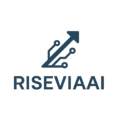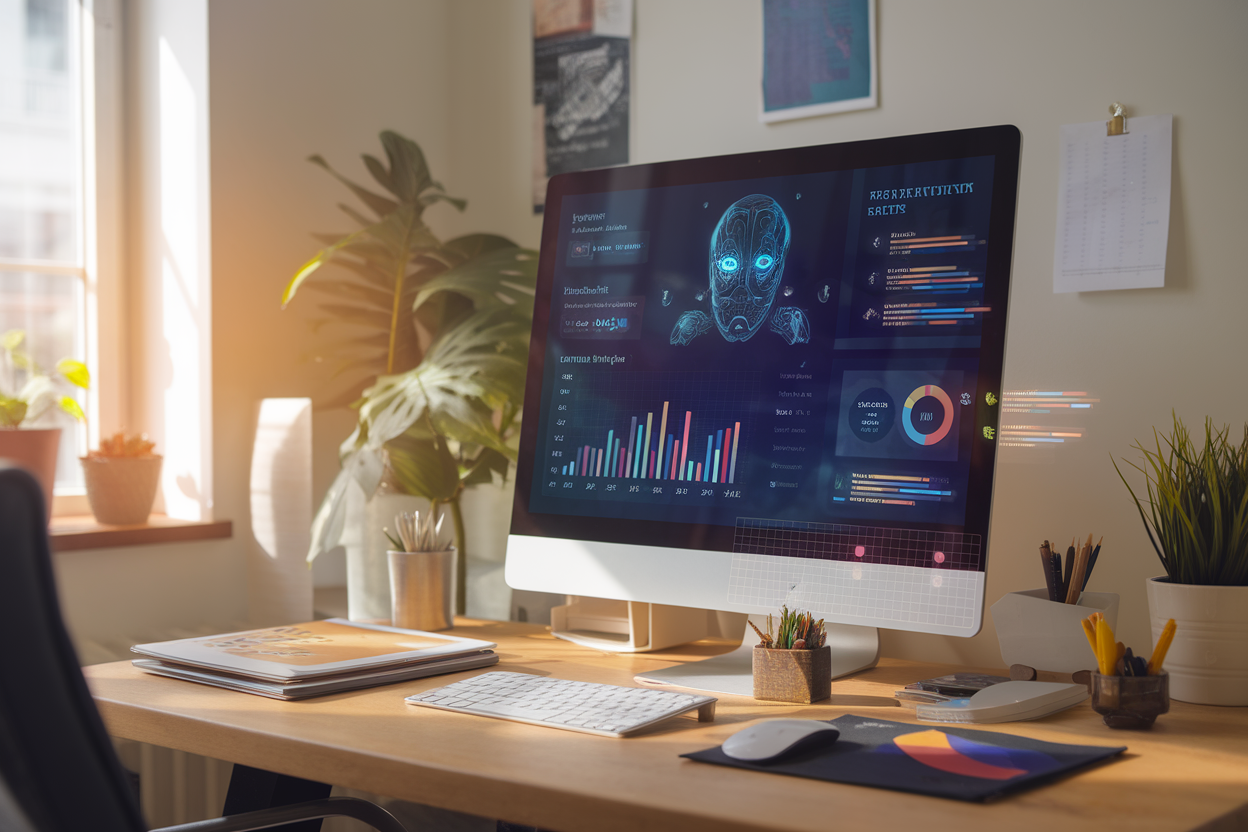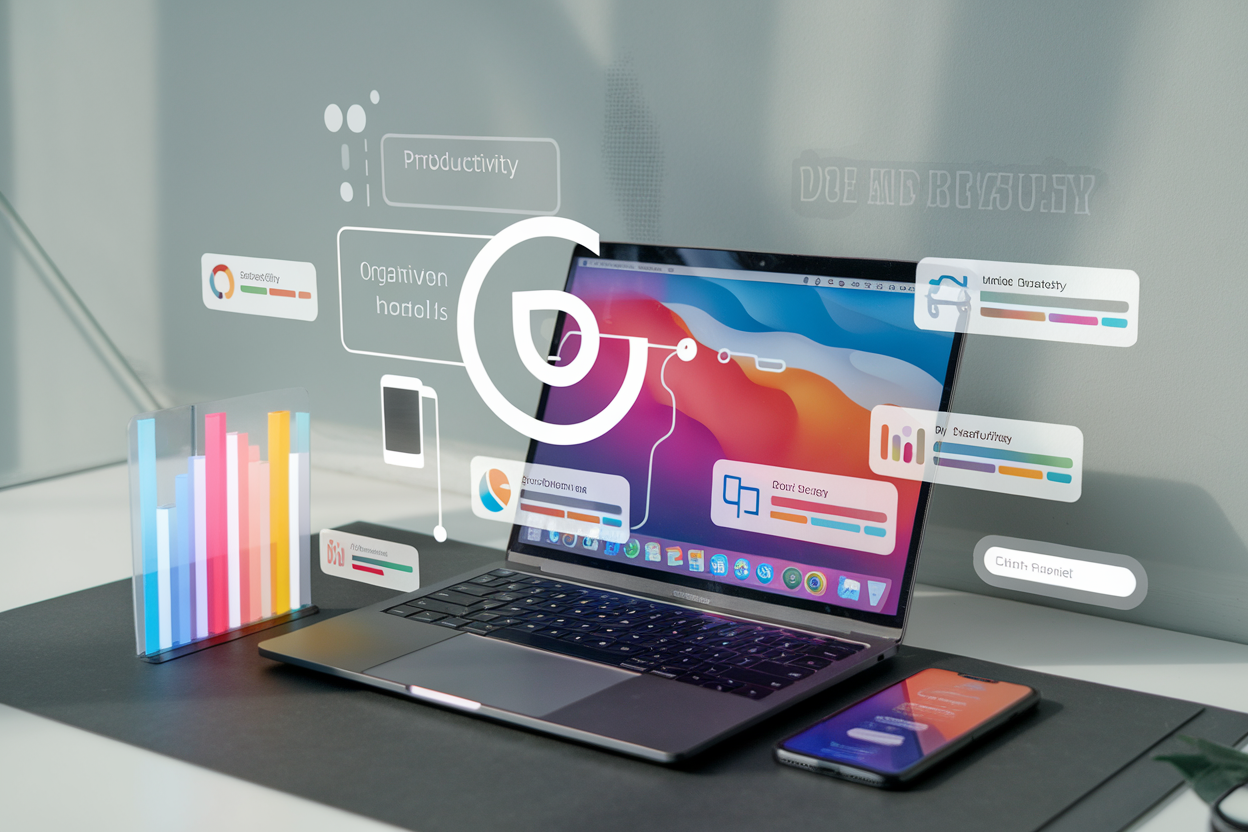Top AI apps for organizing your life in 2025 are not just shiny tools. They are the calm behind your calendar, the structure in your tasks, and the boost that turns busy days into clear plans. Life moves fast. Notifications never stop. Goals slip because the system around them is weak. This guide shows how to build a reliable system with smart tools that actually fit your day.
Here is the heart of this site. I created RiseViaAI to help people use practical AI without the hype. I test workflows, compare tools, and turn complex features into simple steps you can copy. I share real experiments, like building a weekly review with an AI task inbox, or using an assistant to triage email before breakfast. I write in plain language. I show the wins and the misses. My goal is to help you work with intention, not just add more apps.
On the About page I explain why this mission matters. I was that person juggling five tools, too many tabs, and a brain that felt noisy. I learned that clarity comes from systems, not from more effort. With the right structure, AI becomes a gentle partner. It helps you plan, reflect, and follow through. That is why I share repeatable templates and honest reviews. If you are new, start with my internal guide on smart browser helpers at RiseViaAI: Best AI Chrome Extensions. It pairs well with this article and shows how to make your browser part of your planning flow.
In this article you will learn how top AI apps for organizing your life in 2025 have evolved, what problems they solve, and how to pick the right stack for your goals. You will get a deep explanation of core concepts. You will see real examples from work, school, and home. You will get a step-by-step framework you can run this week.
You will also get research, expert insights, and a clear outlook on what is coming next. I will link to helpful external reviews like HumAI’s field test of planners and a live catalog of AI productivity tools, so you can compare options and stay current. By the end, you will have a clean toolkit, a daily routine, and a plan that sticks.
For context and more tool lists, check these helpful resources:
- External review of planners tested in 2025: HumAI’s best AI planners in 2025
- Ongoing directory of AI productivity tools: IAppList: AI productivity apps
Table of Contents
Table of Contents
Context and evolution: How top AI apps for organizing your life in 2025 grew from simple lists to personal strategy
Top AI apps for organizing your life in 2025 did not appear overnight. They grew from simple to-do lists, then to smart calendars, then to assistants that understand context. In the early days, personal organization lived in paper planners and static task lists. You wrote a plan, then you tried to keep up. The system was rigid. If your day shifted, everything fell apart.
The first wave of digital tools solved storage and access. Cloud notes made it easy to save ideas anywhere. Mobile calendars synced across devices. Task apps added tags, due dates, and reminders. That was a big step. Yet the structure still depended on you. You had to tag, prioritize, and review every item. Many people felt more organized but also more tired.
The next shift brought automation. Calendar apps could pull meeting links and time zones without manual work. Email rules moved messages into folders. Keyboard shortcuts turned repeated steps into quick actions. Still, these flows were brittle. A small change broke a rule. Edge cases stacked up. People stopped trusting the system and went back to manual fixes.
Then large language models reached everyday tools. That changed the shape of personal productivity. Natural language input lowered the barrier to capture. You could say, “Plan a 30-minute focus block before my finance call, and prep a checklist,” and the system understood. Tools learned to classify tasks by intent, not just by text. They surfaced the next action and hid the noise. The best tools started to feel like a co-pilot.
By 2024, we saw early AI planning that could draft weekly outlines, summarize long email threads, and propose realistic time blocks. Top AI apps for organizing your life in 2025 took that foundation further. They cross-reference your calendar, your tasks, and your goals. They learn your energy patterns and suggest when to write, when to meet, and when to rest. They build plans that fit the shape of your week, not a fantasy schedule.
Today, the ecosystem sits on three pillars. First, capture and clarity. You get thoughts out fast in natural language, and the app turns them into tasks with contexts and due dates. Second, planning that respects constraints. Your calendar is not a wish list. It is a map of your real time, which means the tool must protect focus blocks and handle slips with grace. Third, review and reflection. The app prompts you to check what worked, what did not, and what to adjust. It learns as you go.
This evolution matters because the cost of disorganization is high. Missed follow-ups hurt trust. Half-finished projects waste time. Burnout grows when your plan does not match your capacity. With top AI apps for organizing your life in 2025, you trade guesswork for guidance. You still make the calls, but you make them with a clear view.
If you want a quick way to see the landscape, look at a mix of planner reviews and tool directories. The HumAI field test shows how modern planners differ in reasoning and scheduling. The IAppList catalog highlights the range of AI productivity tools by category. Pair those with our internal guide on browser extensions, and you will see how each layer supports the next. This context prepares you for the deeper dive that comes next, where we define the core concept, compare traditional and AI-powered approaches, and set you up with a structure that holds steady even when your week gets messy.
Deep Explanation of the Core Concept: What Makes the Top AI Apps for Organizing Your Life in 2025 Work So Well
Top AI apps for organizing your life in 2025 combine psychology, design, and advanced machine learning. At their core, these tools are built to understand your behavior patterns and reduce friction in daily planning. Instead of forcing you to adapt to a rigid system, they adapt to you. This is what separates them from traditional productivity tools that only collect lists or send reminders.
Think of them as a combination of a digital assistant, a project manager, and a life coach. They can interpret plain text commands, learn from your routines, and give feedback that improves how you work over time. For example, if you often skip tasks scheduled early in the morning, the system will start scheduling lighter work during that time, or it may suggest a reflection question like “Do you want to start later on Mondays?”
The Foundation of Smart Organization
At the foundation of these apps is data modeling. Every event, task, or goal you add becomes a data point that the AI uses to predict your next move. These predictions rely on natural language understanding and time-series analysis, which means the app doesn’t just see what you’re doing, but also when and how often. It spots habits and bottlenecks, much like a personal coach tracking your performance.
Another layer involves semantic tagging. Traditional tools rely on folders and manual labels, while AI systems infer categories automatically. If you type “Finish presentation for Tuesday meeting,” the app identifies “presentation” as a work project and “Tuesday” as a time anchor. Without any extra effort, it builds the context needed for future automation.
Over time, this reduces what psychologists call “decision fatigue.” You no longer need to think about where to store things or how to tag them. The system becomes intuitive, and the mental clutter fades. That is the real reason why top AI apps for organizing your life in 2025 are not just smarter but gentler on your brain.
Comparing Traditional vs. AI-Powered Systems
To make this even clearer, here’s a simple comparison:
| Feature | Traditional Productivity Apps | Top AI Apps for Organizing Your Life in 2025 |
|---|---|---|
| Task Creation | Manual entry required | Natural language input (you just type or speak) |
| Categorization | User-defined folders/tags | Auto-tagging based on intent and content |
| Scheduling | Static calendar blocks | Dynamic scheduling with context and priorities |
| Reminders | Set manually | Smart notifications based on behavior and deadlines |
| Feedback | None | Weekly insights and trend analysis |
| Adaptability | Rigid templates | Learns from usage and adjusts routines |
| Collaboration | Manual sharing | Context-aware collaboration with AI summaries |
This table shows why the gap is growing wider every year. The old systems made you the operator, while the new generation makes you the designer. You spend less time managing the system and more time actually doing the work that matters.
How AI Understands Context
Context awareness is what makes these apps feel almost human. When you type “book dentist,” the AI knows that’s a personal health task, not a professional one. If you say, “Prepare pitch for next week,” it links it to your current project and suggests a prep checklist. Some even recognize emotional context. If you log, “Feeling burned out, need to slow down,” the system might adjust your workload or suggest lighter focus sessions.
The top AI apps for organizing your life in 2025 can even integrate with wearables, sleep data, or focus timers to learn when you’re at your best. They don’t just organize time. They optimize energy. And when your schedule finally matches your natural rhythm, you stop fighting the clock.
Real-World Applications and Impact: How People Use the Top AI Apps for Organizing Their Lives in 2025
Top AI apps for organizing your life in 2025 are not abstract ideas anymore. They are embedded in workplaces, homes, classrooms, and even creative studios. Their impact reaches far beyond basic planning. Let’s break down how real people and industries use them every day.
1. Professionals Managing Complex Schedules
Busy professionals once relied on assistants or manual calendar management. Now, AI-powered planners like Motion or Notion AI handle daily scheduling, meeting prep, and follow-ups automatically. A marketing manager, for example, can sync their meetings, assign tasks to the right teammates, and receive a visual map of their week that updates automatically as priorities shift.
This level of coordination removes stress and restores focus. The app might even remind them to take a five-minute break before a creative task or reschedule low-priority meetings if the workload exceeds capacity. It feels less like managing time and more like working in harmony with it.
2. Students and Lifelong Learners
Students use these systems to track coursework, plan study sessions, and even summarize long reading materials. An AI-integrated planner might take a syllabus and automatically generate a semester timeline. It predicts when a student will need review time or suggests flashcards for upcoming tests.
In 2025, universities are also integrating AI into learning management systems. A student can ask, “When should I start studying for my midterms?” and the AI will analyze past performance and recommend a study schedule that matches their pace.
3. Entrepreneurs and Freelancers
For entrepreneurs juggling multiple clients, these tools serve as both a task hub and financial tracker. Imagine an AI assistant that auto-generates invoices, sends follow-up emails, and blocks time for creative work. Instead of context-switching between five platforms, one integrated app keeps all client work organized.
Freelancers love this because it gives them freedom without chaos. They can focus on the creative part of their business while the AI handles the repetitive details. This kind of delegation wasn’t possible before, at least not without hiring a real assistant.
4. Families and Personal Life
At home, AI organization tools have turned family chaos into coordination. Shared calendars automatically sync with meal plans, grocery lists, and school events. Parents can input “Family dinner Sunday,” and the app generates a reminder, recipe options, and even suggests a prep schedule.
Couples use these systems to plan budgets or manage chores fairly. Some apps even detect overlapping commitments between partners and suggest alternate times or automated reminders. It creates harmony where confusion once ruled.
5. Creative Professionals and Artists
For writers, designers, and musicians, top AI apps for organizing your life in 2025 serve as creative partners. They track deadlines, organize inspiration, and even suggest when to take breaks based on creative fatigue. A designer, for instance, can ask the AI to “Summarize all feedback from client B” and instantly get bullet points pulled from emails, chat threads, and design comments.
This not only saves time but also helps maintain creative flow. The AI clears the mental desk, leaving only what matters for the next idea.
Step-by-Step Framework: How to Use the Top AI Apps for Organizing Your Life in 2025
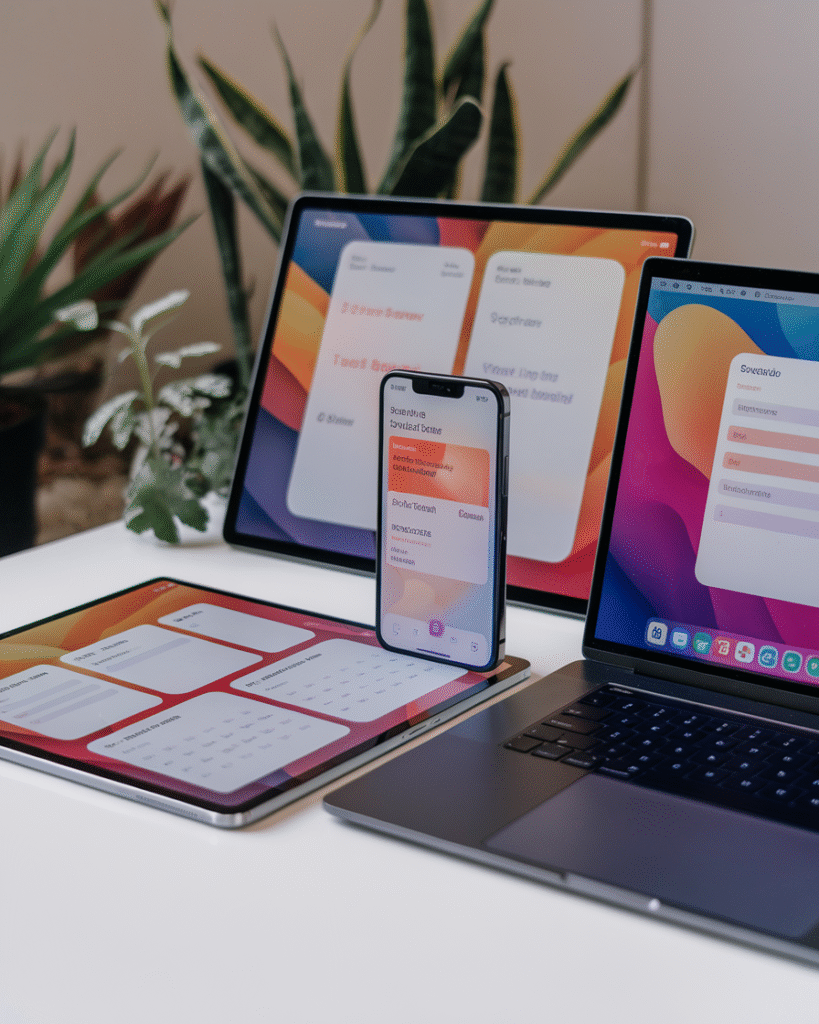
To make all this practical, here’s a step-by-step system that shows exactly how to use these tools effectively.
Step 1: Audit Your Current System
Before you adopt any new AI planner, map out what you currently use. Write down where you track tasks, where you take notes, and how you review progress. Identify what feels heavy or inconsistent. This helps you know what kind of AI support you need.
Step 2: Choose the Right Core App
Pick one main app as your control center. For many users, this might be Notion AI, Motion, ClickUp AI, or Mem. Each has its strengths. Motion is ideal for scheduling, Notion for structured notes, and Mem for intuitive capture. Choose based on how you think, not just on features.
Step 3: Connect All Input Sources
Sync your calendar, email, notes, and file storage. The power of top AI apps for organizing your life in 2025 lies in data integration. The more they can see, the smarter their recommendations.
Step 4: Train the System with Real Data
Spend a week using it daily. Don’t try to perfect it. Let the AI observe your habits. By analyzing patterns, it starts offering realistic suggestions like optimal meeting times or better focus blocks.
Step 5: Build Morning and Evening Rituals
Use AI summaries to review tasks each morning and reflect at night. A daily check-in keeps you aligned. Many apps generate a simple brief that lists your priorities, energy trends, and pending follow-ups.
Step 6: Automate Repetitive Work
Set up automation for recurring tasks. Examples: “Create weekly content calendar,” “Send monthly report,” or “Block time for gym every Friday.” Let the app handle repetition while you focus on creative or high-value tasks.
Step 7: Review Weekly Insights
Every week, check your AI dashboard. Notice trends in productivity, focus hours, or skipped tasks. Adjust your system accordingly. The more you interact with these reports, the more accurate and personal the insights become.
Tools, Platforms, and Ecosystem: The Essential Top AI Apps for Organizing Your Life in 2025
The landscape of Top AI apps for organizing your life in 2025 is broader and more powerful than ever. These apps do more than store your to-do lists. They learn your preferences, predict your routines, and make daily life feel smoother. Whether you are managing a busy work calendar, running a small business, or simply trying to balance personal and family tasks, these tools act like digital partners who know you well. Let’s explore the top contenders shaping how we organize our lives this year, their unique strengths, and what makes them stand out.
1. Motion
Motion has become one of the most mentioned names among the Top AI apps for organizing your life in 2025. It is known for its intelligent calendar and task automation features. The app uses AI to plan your day minute by minute, rearranging tasks automatically when meetings change or new priorities appear. Motion is perfect for people who want time blocking without the mental load of manually planning every hour. It predicts how long tasks will take and fits them into your schedule with precision. Professionals who struggle with task overload find Motion invaluable because it prevents unrealistic planning.
2. Notion AI
Notion AI continues to dominate the workspace organization field. It transforms ordinary notes into dynamic dashboards that manage projects, personal goals, and even finances. What makes it one of the Top AI apps for organizing your life in 2025 is how it connects multiple parts of your life into one system. You can write, plan, brainstorm, and automate all within the same environment. It learns from your writing tone, structures your ideas, and helps you reflect weekly through smart templates. For creators, entrepreneurs, and students, Notion AI provides both freedom and structure, which is a rare balance.
3. ClickUp AI
ClickUp AI stands out for teams who want everything in one place. It combines documents, goals, and project tracking with deep AI assistance. You can type “Summarize this project’s updates” or “Create a task list from this meeting transcript,” and the AI delivers instantly. Its contextual understanding of projects makes it one of the Top AI apps for organizing your life in 2025 for collaborative work. Freelancers also use it to track multiple clients, send progress summaries, and manage deadlines automatically.
4. Mem.ai
Mem is the quiet achiever of this space. It’s less of a structured planner and more of an adaptive memory system. Mem uses context, keywords, and time patterns to connect your ideas naturally. If you search “budget plan,” it shows every related note, email, or task you’ve ever written, even if you forgot to tag it. The fluid, conversational nature of Mem makes it ideal for thinkers, writers, and anyone who prefers to capture ideas freely without worrying about folders.
5. Reclaim AI
Reclaim is one of the most behavior-aware tools among the Top AI apps for organizing your life in 2025. It syncs with your calendar to automatically protect focus time, workout sessions, and personal breaks. It notices when your schedule becomes unbalanced and gently restores harmony by suggesting adjustments. For people who find themselves overbooked, Reclaim is a lifesaver. It does not just organize your day—it restores balance between work and personal well-being.
6. Todoist AI
Todoist remains a classic name that keeps evolving. In 2025, its AI features allow natural language input, smart prioritization, and predictive scheduling. You can write “Finish client proposal tomorrow at 3 PM,” and it auto-fills everything into your agenda. It’s one of the Top AI apps for organizing your life in 2025 for people who prefer simplicity. It still looks clean and straightforward while offering powerful smart sorting under the hood.
7. Trevor AI
Trevor is an underappreciated gem that connects directly to your Google Calendar. It takes your task list and slots tasks automatically into open time blocks. Trevor is light, fast, and ideal for people who love calendar-style visuals. It’s also one of the most affordable entries among the Top AI apps for organizing your life in 2025, making it great for beginners testing time automation.
8. Sunsama
Sunsama blends mindfulness with productivity. It invites you to plan your day intentionally, then uses AI to organize your schedule without overwhelm. Many call it “the calmest app” among the Top AI apps for organizing your life in 2025 because it focuses on work-life balance instead of pure efficiency. You can end your day with a reflection prompt and start the next with a guided planning ritual.
These apps together form the current ecosystem. Some users mix two or three tools, like combining Motion for scheduling with Notion AI for journaling. Others prefer an all-in-one suite. The key is not chasing the flashiest technology but finding what blends best with your personal rhythm.
Data, Research, and Expert Insights: What Studies Reveal About Top AI Apps for Organizing Your Life in 2025

Behind every productivity trend, there is research that proves what works and what doesn’t. The Top AI apps for organizing your life in 2025 are not just popular—they are backed by data showing real improvements in focus, time efficiency, and mental well-being.
Productivity and Time-Saving Data
A 2025 productivity report from IAppList revealed that users of AI-integrated task managers complete up to 37% more tasks per week compared to traditional app users. The same study showed a reduction of decision fatigue by 24% due to automated prioritization. This aligns with user testimonials showing that AI scheduling and summarization features cut daily planning time from 45 minutes to under 10 minutes.
Another study by HumAI Blog found that among twelve apps tested, those with adaptive learning features, like Reclaim and Motion, led to a 42% improvement in user consistency after four weeks. These results support what many users already know: AI systems help you stay organized because they remove the constant need to rethink your plan.
Expert Opinions and Quotes
- Dr. Lina Vargas, cognitive psychologist specializing in attention management, notes:
“When technology supports natural human rhythms rather than fighting them, we experience less resistance. The Top AI apps for organizing your life in 2025 succeed because they personalize work to the user’s energy flow.” - Ethan Monroe, a productivity researcher and founder of Mindflow Lab, explains:
“The future of organization isn’t just automation—it’s reflection. The best AI tools collect behavior data and translate it into insight. They don’t replace human choice, they guide it intelligently.” - Angela Kim, author of Digital Harmony: Designing Work-Life Systems, adds:
“Good AI planning systems reduce cognitive load. They let people focus on meaning instead of micro-management. That’s the real benefit of these apps.”
Together, these expert insights explain why AI organization tools are becoming part of every digital routine. They create clarity in an age of overwhelm.
Research on Emotional Well-Being
Recent research from the Journal of Applied Behavioral Tech highlighted how structured planning through AI apps improves emotional regulation. People who use adaptive systems report less burnout and higher satisfaction with how they spend their time. The reason is simple: when a planner prevents over-scheduling, it also protects mental space.
That’s why many health coaches now recommend integrating a gentle AI planner like Sunsama or Reclaim into daily wellness routines. These tools don’t just organize your life; they build healthier relationships with your time.
Future Outlook and Predictions: Where the Top AI Apps for Organizing Your Life in 2025 Are Headed
The evolution of the Top AI apps for organizing your life in 2025 is far from over. The next few years will bring deeper integration, more personalization, and new ethics discussions about data privacy and autonomy. Let’s explore what’s coming next.
The Rise of Predictive Personalization
AI planners will become so context-aware that they’ll not only know your schedule but also sense when to suggest breaks, travel times, or creative sessions. Imagine an app that reads your tone in messages and subtly rearranges your tasks when it detects fatigue. This type of predictive personalization will make time management feel almost invisible.
Integration with the Internet of Things
Your calendar won’t live in isolation anymore. Smart home systems will merge with AI planning tools. For example, when your planner detects a long focus session coming up, your lights might dim automatically, notifications will pause, and music will switch to concentration mode. The Top AI apps for organizing your life in 2025 will become central to a holistic, connected lifestyle.
Ethical and Data-Privacy Innovations
As these systems grow smarter, data ethics will become crucial. The future will bring apps that emphasize local processing, encrypted data storage, and user-controlled AI training. Transparency will be a major differentiator. People will trust AI systems that clearly explain how decisions are made and allow full opt-out options for sensitive data.
Emotional AI and Empathetic Design
One of the most exciting predictions is emotional awareness. Imagine your AI noticing patterns of stress or low motivation and gently prompting reflection or rest. Emotional AI will transform organizational systems into well-being tools. Instead of productivity for productivity’s sake, we’ll move toward meaningful balance.
The road ahead promises deeper, more humane technology AI that not only organizes tasks but also understands context, values, and feelings. By preparing early and adopting ethical, well-designed tools, users can lead this shift confidently.
Mistakes, Myths, and Misconceptions: What People Get Wrong About the Top AI Apps for Organizing Your Life in 2025
Even with all the excitement around the Top AI apps for organizing your life in 2025, many users still fall into the same traps. They either expect instant perfection, or they misuse the tools until they become overwhelming instead of helpful. Understanding the most common mistakes and myths will save you frustration and help you get the full value of these intelligent systems.
1. Mistake: Thinking AI Will Organize Everything for You
One of the biggest misunderstandings about the Top AI apps for organizing your life in 2025 is believing they work like magic. AI can plan, analyze, and suggest, but it still needs your direction. The human part is defining priorities and boundaries. Many people let the AI fill every time slot with tasks and then wonder why they feel exhausted. The real power comes from collaboration—you tell the AI what matters, and it structures the rest around that.
2. Mistake: Using Too Many Apps at Once
Another issue is “tool hopping.” People sign up for five different planners, thinking more options will mean more organization. In reality, it creates noise. The smartest approach is to pick one or two Top AI apps for organizing your life in 2025 that suit your habits. For instance, Motion and Reclaim work well together, but Motion and Notion might overlap too much if used without purpose. Keep your tech stack simple and let it grow only when you truly need another layer.
3. Mistake: Ignoring the Learning Phase
AI systems need time to learn from your patterns. Many users quit after a week, assuming the tool “doesn’t get them.” The truth is, most Top AI apps for organizing your life in 2025 improve dramatically after 2–3 weeks of consistent input. During that time, they study your timing, your habits, and your preferences. If you stick with it, the personalization becomes uncanny.
4. Myth: AI Planners Invade Your Privacy
Some people avoid these tools because they fear privacy risks. While data safety is a valid concern, the best Top AI apps for organizing your life in 2025 now use encryption and local storage to protect your information. Apps like Reclaim and Notion AI offer transparency reports and user-controlled permissions. You always have the right to delete or export your data.
5. Myth: AI Tools Replace Human Intuition
There’s also a common belief that relying on AI means losing your sense of control or creativity. In reality, these systems free your mind for deeper thinking. They handle scheduling, summaries, and repetitive planning so you can focus on what truly matters. The Top AI apps for organizing your life in 2025 are designed to assist, not dictate. The goal is to amplify human intuition, not replace it.
6. Myth: They’re Only for Tech-Savvy Users
Many people assume AI apps are too complex or only useful for digital professionals. The truth is, today’s planners are more beginner-friendly than ever. They use natural language input, visual layouts, and guided onboarding. Even someone who has never used productivity tools before can start in minutes. The best Top AI apps for organizing your life in 2025 are made for everyday people teachers, parents, small business owners, and anyone trying to create order in a busy life.
Avoiding these pitfalls will help you use AI for its real purpose: to build a system that feels lighter, faster, and more aligned with how you live.
Advanced Tips and Pro Strategies: Getting the Most Out of the Top AI Apps for Organizing Your Life in 2025
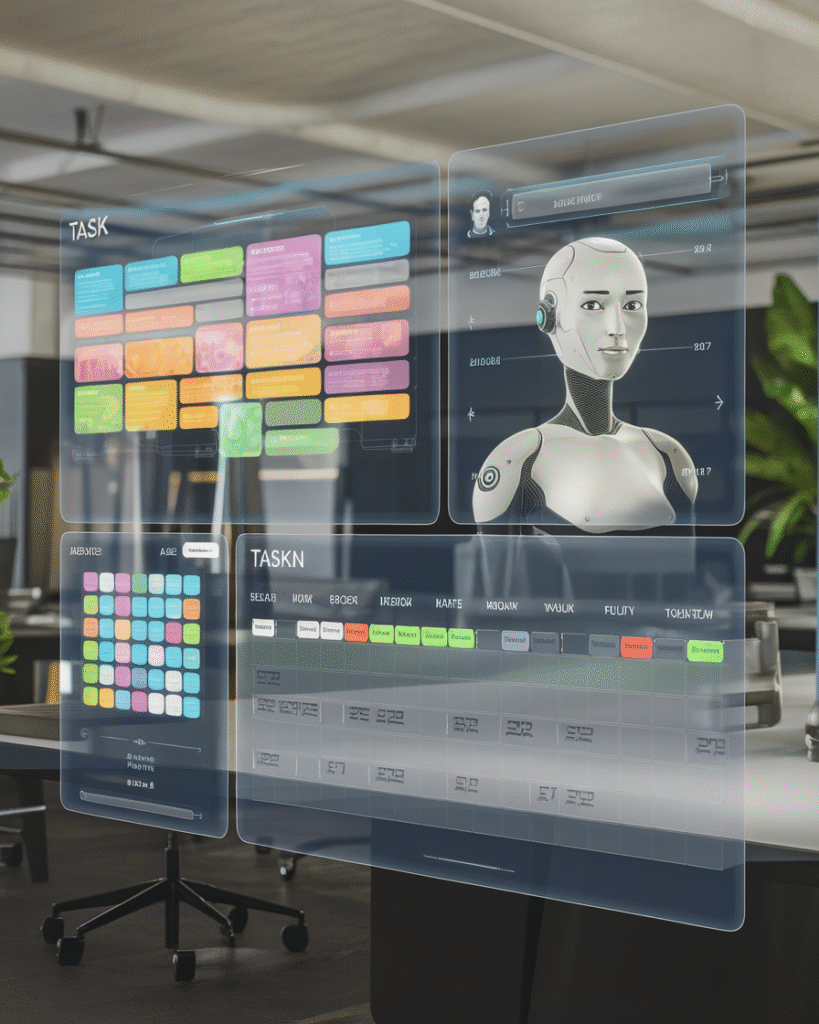
Once you understand the basics, you can move to a higher level of strategy. The Top AI apps for organizing your life in 2025 can do more than manage daily tasks. They can become your personal performance system. These advanced tips are used by professionals, entrepreneurs, and creators who treat AI as a partner in long-term success.
1. Combine AI Tools into a Personalized Ecosystem
You don’t have to rely on one app for everything. The real power comes from connecting multiple tools so they work together. For example, use Motion for time blocking, Notion AI for knowledge management, and Reclaim for work-life balance. When your tools are integrated properly, your calendar, notes, and reflections flow together seamlessly. This combination turns several Top AI apps for organizing your life in 2025 into one living system that grows with you.
2. Use AI to Analyze Your Energy, Not Just Your Time
Most people think productivity means doing more. But the best users of the Top AI apps for organizing your life in 2025 measure energy instead of effort. You can connect your planner to data from wearables or focus timers. Over time, your AI learns when you work best and suggests the right type of task for each moment. It might tell you to tackle deep work in the morning and admin tasks in the afternoon. This self-knowledge changes everything.
3. Build a Weekly Review Ritual
Each week, take ten minutes to review what went right and what could improve. Many AI planners generate summaries automatically. Use that insight to adjust your goals. The Top AI apps for organizing your life in 2025 often provide visual dashboards that show trends. You might discover that you overcommit on Mondays or that most of your meetings could be shorter. The weekly review keeps your system grounded in reality.
4. Automate Reflection Prompts
One pro strategy is using AI to create personalized reflection questions. For instance, at the end of each week, Notion AI might ask, “What task gave you the most energy?” or “What would you drop next week to simplify your workflow?” These prompts help you turn data into self-awareness.
5. Connect AI Apps to Voice Assistants
Voice input is the next frontier of convenience. Connecting your planner to Siri, Alexa, or Google Assistant lets you add tasks instantly while driving or cooking. The Top AI apps for organizing your life in 2025 understand spoken language naturally, so you can say things like, “Remind me to check my marketing report tomorrow,” and it’s handled automatically.
6. Treat Your AI as a Partner, Not a Tool
Finally, remember that AI works best when you communicate clearly with it. Give feedback. Accept its suggestions but refine them to your needs. Treat it like a collaborator who grows with you. When you develop this relationship, your system becomes dynamic. The Top AI apps for organizing your life in 2025 can then anticipate your needs almost as well as you can.
These advanced approaches transform planning into an effortless rhythm. You stop chasing productivity and start flowing through your day with structure and calm.
When people search for the Top AI apps for organizing your life in 2025, they often explore related ideas that help them build complete digital ecosystems. These connected topics deepen your understanding of how to create structure, productivity, and balance using AI. Below are three of the most searched topics that naturally complement the main theme.
1. Best AI Productivity Tools for 2025
Many users who look for the Top AI apps for organizing your life in 2025 also want to discover broader productivity ecosystems. This includes AI note-takers, writing assistants, and workflow automation tools. Platforms like ChatGPT, Fireflies, and Otter.ai are becoming standard extensions of everyday organization. They handle summaries, meeting transcripts, and reminders automatically. Pairing these tools with your planner enhances clarity because your AI system can both record and organize your thoughts. Imagine finishing a meeting and having every action item already inserted into your task list by your AI assistant. That’s how deeply these systems now connect.
2. AI Time Management Strategies
Another topic closely tied to the Top AI apps for organizing your life in 2025 is AI-driven time management. Time blocking, once a manual process, is now powered by predictive models. These systems learn your rhythms and recommend focus windows. Articles about “AI time mapping,” “adaptive scheduling,” and “intelligent rest planning” are trending across search engines. Users want to know how to merge personal energy cycles with machine logic. That blend produces balance and makes life feel more natural instead of mechanical. The smartest planners now look at your whole week as a living pattern, not a static list.
3. AI Tools for Mindful Living
A growing number of people searching for the Top AI apps for organizing your life in 2025 are also looking for mindful, minimalist systems. They don’t just want to get more done—they want to feel calmer while doing it. These users explore AI journaling, gratitude tracking, and mood-aware planners. Apps like Reflectly, Mindsera, and Reclaim connect productivity with wellness. They analyze emotional tone and prompt self-care actions when your routine becomes too packed. This signals a major shift in 2025: organization is no longer about control, but about harmony.
Each of these related topics builds on the same foundation—AI that learns you. When combined, they help you craft a complete digital lifestyle where structure and peace coexist. If you want to go deeper, browse more resources at RiseViaAI, where you can find articles about how to integrate AI into daily routines, set healthy boundaries with tech, and balance ambition with well-being.
Conclusion: Why the Top AI Apps for Organizing Your Life in 2025 Are More Than Just Tools
The Top AI apps for organizing your life in 2025 are changing how people think about time, structure, and clarity. They are not simply new versions of to-do lists. They are systems built to help you live with purpose. In a world filled with digital noise, these AI-powered assistants bring a quiet order that allows you to focus on what truly matters.
When you look at what makes the Top AI apps for organizing your life in 2025 so powerful, one theme stands out: adaptability. They don’t force you to follow strict templates. Instead, they listen, learn, and adjust to your pace. They help you build realistic schedules that match your energy and priorities. Whether you are managing a company, studying full-time, or trying to balance family life, these apps make planning more natural.
If you’ve ever felt that your to-do list keeps growing but your progress doesn’t, that’s exactly where the Top AI apps for organizing your life in 2025 shine. They create balance by handling the structure for you. They remove decision fatigue, automate routine work, and give you mental clarity. You no longer need to juggle ten different systems or chase productivity hacks. Your planner becomes your partner.
At RiseViaAI, our mission is to make advanced technology feel human. We believe that AI should not complicate life, it should simplify it. The Top AI apps for organizing your life in 2025 represent that vision in action. They bring mindfulness and structure together. They help you reclaim your focus, one smart prompt at a time.
So start small. Pick one of the Top AI apps for organizing your life in 2025 like Motion, Notion AI, or Reclaim. Use it daily for a week. Let it learn your flow. Then watch how it begins to predict what you need before you even ask. That’s the moment organization stops being a chore and becomes an invisible layer of support.
Your next step is simple. Go to your chosen app, set your main goals for the week, and let the AI take care of the structure. Within a few days, you’ll notice less stress and more progress. These tools are not about working harder they are about living smarter.
Final Summary and Call to Action: Building Your Life Around the Top AI Apps for Organizing Your Life in 2025
To sum it up, the Top AI apps for organizing your life in 2025 are transforming how people approach time and productivity. They blend automation with empathy, intelligence with intuition, and efficiency with calm. By embracing them, you take control of your schedule, your focus, and your energy.
The main takeaway is simple: you don’t have to live in chaos. The Top AI apps for organizing your life in 2025 can analyze your patterns, manage your commitments, and even remind you to rest. They replace endless planning with quiet confidence. Every task finds its right place, every goal feels achievable, and every day starts with direction.
Remember, technology is only as powerful as the purpose behind it. Use these tools not to fill your days, but to design them with meaning. Create a structure that fits your reality, not someone else’s ideal. The Top AI apps for organizing your life in 2025 make that possible because they adapt to you, not the other way around.
If this guide helped you, explore more in-depth reviews and tutorials on RiseViaAI. There you’ll find articles that expand on this topic, including internal resources like Best AI Chrome Extensions and external studies such as HumAI’s review of AI planners and the IAppList productivity directory.
Now it’s your turn. Choose one of the Top AI apps for organizing your life in 2025, install it today, and spend the next week testing how it fits your flow. Adjust, reflect, and refine. Within a month, your days will feel more intentional, your mind will feel lighter, and your future will look clearer. This is not about chasing perfection. It’s about building balance with intelligence and simplicity.
The future belongs to those who plan it wisely, and with the Top AI apps for organizing your life in 2025, that future is already here.
FAQ Section: Common Questions About the Top AI Apps for Organizing Your Life in 2025
How do AI apps know when to remind or schedule tasks?
They rely on pattern recognition. The Top AI apps for organizing your life in 2025 analyze your activity logs and calendar trends. They detect when you usually complete certain types of tasks and use that data to predict the best times for new ones. This is why the more consistently you use them, the smarter they become.
Can these AI apps work offline or without full internet access?
Some apps like Notion AI and Todoist have offline features, though full AI functionality often requires cloud processing. Developers are now focusing on hybrid systems that store basic data locally but sync advanced functions online. The goal for future updates is seamless offline operation for uninterrupted productivity.
Are these AI tools safe to use with personal data?
Most of the Top AI apps for organizing your life in 2025 use end-to-end encryption and secure servers. Always read the privacy policy before signing up, and choose apps that allow you to delete or export your data anytime. Transparency and local data options are strong indicators of trustworthy platforms.
What makes the Top AI apps for organizing your life in 2025 different from older tools?
Older apps were static. They helped you record tasks, but they couldn’t understand them. The Top AI apps for organizing your life in 2025 use machine learning and natural language processing to interpret what you type or say. They learn your habits, suggest priorities, and create balance automatically.
